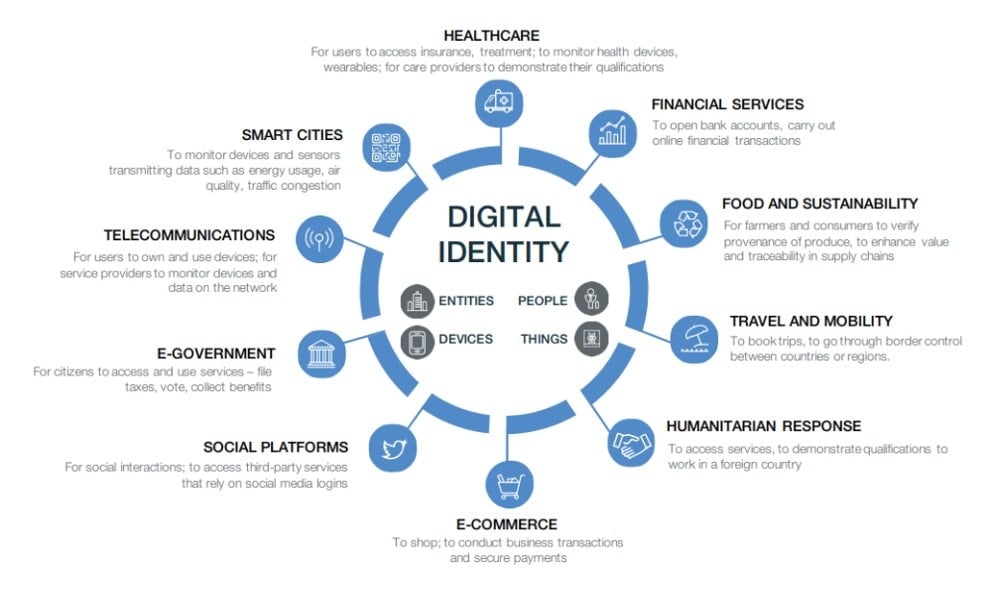Table of Contents
NZDSOS
New Zealand Doctors Speaking Out with Science
Digital ID is being sold as an essential change to modern society via public-private partnerships as global as the World Economic Forum to as local as Digital Identity New Zealand. The stated vision of Digital Identity NZ, whose members include large corporations such as Google, Meta, BNZ and ASB, as well as government departments such as Te Whatu Ora and the Ministry of Foreign Affairs and Trade, is to ensure that everyone can “fully participate in a digital economy and society“. This corresponds with the World Economic Forum vision of inclusivity, meaning that every aspect of human existence is intended to be digitally monitored.

Digital identity differs from digital identification. It builds a “footprint” of your activities, with the capacity to monitor the services you use, where you go, your savings and spendings, interactions, and more. Once central bank digital currency (CBDC) is in place, as planned by the Reserve Bank of NZ, your financial activities can be controlled by the bankers involved in establishing and promoting digital identity. The connection between CBDCs and digital identity is explained well by financier Catherine Austin-Fitts, for example in this 2022 interview, where she describes plans for the average person to have much smaller command on resources and assets, and to be subject to complete central control. She gave a New Zealand context to the issue with Alistair Harding on 12 June 2024, at Reality Check Radio.
According to their 2020 report, Roadmap for Digital Cooperation, the United Nations intend to be the “convener and platform” of the implementation of “digitally enabled services”, which they claim is in line with their Sustainable Development Goals. As we have written about before, these goals originated from the 1987 Brundtland Report “Our Common Future” which laid the foundation for Agenda 21 & Agenda 2030: plans for a collectivist existence under totalitarian rule. Learn more from these presentations and interviews with English researcher Sandi Adams, Australian researcher Kate Mason and New Zealand researcher Ross Hebblethwaite.
Euphemistic language is used proclaiming catastrophic outcomes unless “strong and sustained international cooperation” is achieved, requiring meaningful transformation to global governance. We have written about this extensively in relation to the World Health Organization plans for global governance in health.
Similar legislative implementations are occurring at the overarching United Nations level. In September 2024 global leaders will convene in New York for their “Summit of the Future: Our Common Future“, to adopt the Pact for the Future, which will include a Global Digital Compact and a Declaration on Future Generations. These documents tie in with the World Health Organization’s Global Health Initiative to transform health care towards digital surveillance and control.
Local implementation of these global goals is occurring through our own national and local governments and councils. ICLEI – Local Governments for Sustainability and the Smart Cities Council are two examples of public-private partnerships established to implement Agenda 2030 at local level. Every town council in New Zealand is signed up to the Smart Cities Council of Australia and New Zealand, claiming to deliver “positive, self-sustaining social, environmental, and economic outcomes for people, place and planet” via corporate control of public life.
In these Smart Cities envisioned for our imprisoned future even our street lights will be used for monitoring as in this article referring to Tauranga. The system is “upgradable ‘over the air’ providing future proofing for technological advancements, it is scalable and can be adapted for various IoT (Internet of Things) applications, such as water resource management, remote metering and Smart City sensors.”
As we experienced through the Covid era, this will empower and enrich those implementing the rules and regulations, whilst disempowering and impoverishing everyone else. This has enormous implications for society, including for population health outcomes which have already diminished due to senseless and harmful pandemic related responses.
In New Zealand the Digital Identity Services Trust Framework Act 2023, proposed without opposition in October 2021, will come into force on Monday 1 July 2024. Predictably avoided by legacy media in order to remain largely unknown to the general public who might otherwise resist, this legislation sets the stage for implementing digital identity for transactions between individuals and organisations in New Zealand.
Call to Action: Oppose Digital ID Now
If you think this is part of the ongoing imposition of authoritarian rule, and you don’t want it, then please read and consider signing the Petition of Tracey Coxhead: Repeal the Digital Identity Services Trust Framework Act 2023 before 31 July 2024. Spread the word by sharing this article.
Dr Mike Yeadon advises the best action regarding digital ID and CBDCs. Decline it. Use cash at every possible opportunity. Refuse to do business with those who won’t accept cash. https://rumble.com/embed/v3xq56m/?pub=4
This article was originally published at NZDSOS.









